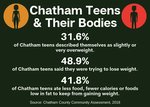
The rise of social media has given way to people called “Instagram influencers” — people who use their Instagram platforms to sell products or generally influence public opinion about a topic.
If you search the term on Google, you’ll come up with stories about how to become one, how to connect your business or product with them and a news item that just broke last week.
According to CBS News, Instagram announced that it would be restricting posts promoting weight loss products and cosmetic procedures. Some posts will be hidden from users under 18, while some will be removed from Instagram and Facebook altogether.
Emma Collins, the social media giant’s public policy manager, said in a statement that the company wanted Instagram “to be a positive place for everyone that uses it and this policy is part of our ongoing work to reduce the pressure that people can sometimes feel as a result of social media,” CBS reported.
This comes at a time when youth in Chatham County and beyond are feeling the effects of a culture they feel values looking a certain way. In 2014, Minnesota-based psychologist Heather Gallivan reported that 53 percent of 13-year-old girls in America are unhappy with their bodies; that number rose to 78 percent by age 17.
Specific numbers are hard to come by in Chatham, but the 2018 Chatham County Community Assessment revealed that more high schoolers said they were trying to lose weight (48.9 percent) than those who described themselves as slightly or very overweight (31.6 percent). Additionally, 41.8 percent ate less food, fewer calories or foods low in fat to keep from gaining weight.
Michelle Brick, a counselor at Bonlee School, said she often has conversations with mostly girls about this topic. But she’s not hearing kids talk about celebrity appearances. It’s more about them “comparing themselves to their peers.”
In her book “Under Pressure: Confronting the Epidemic of Stress and Anxiety Among Girls,” clinical psychologist Lisa Damour writes that “girls get the message that their looks count for much of their value,” citing her time as a consulting psychologist for a all-girls private school in Ohio. But like Brick, she says it’s not about celebrities.
“There has never been a generation as steeped in pictures as the girls we are raising today,” Damour writes. “In addition to viewing traditional media, they consume hundreds, if not thousands of photos, posted online by their friends. And what do they see in a lot of those posts? Girls showcasing their appearance, seeking to replicate the perfected look of professional models, and doing what they can to run up the likes each photo will receive.”
A poor body image can have potentially severe health consequences. Gallivan said that more than half of teen girls and 30 percent of teen boys use “unhealthy weight control behaviors” such as “skipping meals, fasting, smoking cigarettes, vomiting and taking laxatives.”
It’s not that Chatham doesn’t have a weight problem. Obesity is the No. 2 Health Impact Priority for the Chatham Health Alliance as revealed in the 2018 CCCA. But Brick says she wants the students she serves — and all students across to Chatham County — to move away from a solely “lose weight” mindset.
When she talks with students — mostly girls, she says — she tries to focus on the concept of “wellness” and “how you deserve to treat yourself,” mostly through small group conversations.
“Wellness looks like healthy food, healthy sleep, healthy relationships and a healthy self-concept,” Brick says. “We spend most of our time on that. I don’t ever get into bad food, good food. We spend a majority of our time talking about how we deserve to be treated and how we deserve to think about and treat ourselves.”
She said she wants parents to consult with their child’s doctor “if they are concerned about their child’s weight,” but otherwise to observe their child and ask some questions.
“I will talk with the parents about how expansive is this concern,” she said. “What do you see your child doing? What is your child saying? Do you see them restricting anything? Depending upon that answer, I might go a few different ways.”
That might potentially include mental health services. The American Psychological Association, in a 2014 paper, wrote that body image’s connection with low self-esteem in adolescents “can lead to eating disorders, early sexual activity, substance use and suicidal thoughts.”
Brick says body image and total wellness is a “personal passion” of hers,” and she tries to “model that with our kids.”
“It all comes back down to having students think more about wellness than weight,” Brick said. “Taking more of a holistic approach with them — thinking about the sleep that we get, the way that we move our bodies, the way that we feed our bodies and, most importantly, the way that we think about ourselves and our bodies. That would be the most healthy approach.”
Reporter Zachary Horner can be reached at zhorner@chathamnr.com or on Twitter at @ZachHornerCNR.